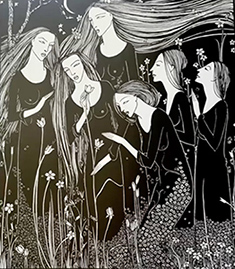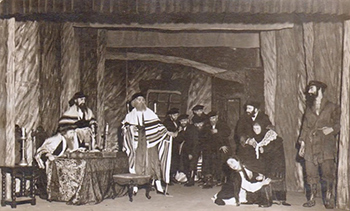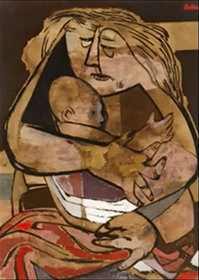To provide a bit of relief from lockdown, isolation, and social distancing, SCoJeC has been providing people with an opportunity to think about Jewish art and culture in Scotland every Thursday morning since the end of March. After two sessions where group members got to know one another and shared our thoughts about our favourite pieces of art and our gallery visiting experiences, we have enjoyed fascinating talks so far from five professionals in the field: Dianne Gardner, Curator of the Maclaurin Gallery in Ayr, Mia Spiro, lecturer in Jewish Studies at the University of Glasgow, Sarah MacDougall and Rachel Dickson of the Ben Uri Gallery and Museum, and Deborah Haase, Curator of the Scottish Jewish Archives Centre.
 |
The first speaker, Dianne Gardner, spoke about the 'Cultural Connections' Festival of Jewish Art that she curated at the Maclaurin Gallery in Ayr, in the summer of 2014. The festival centred on a major exhibition of four Jewish artists who worked in Glasgow in the 20th century: Benno Schotz, Jankel Adler, and Hannah Frank, as well as Josef Herman, whose collection had come to Ayr courtesy of the Ben Uri Gallery in London. Also on display was Judah Passow’s photography exhibition, Scots Jews, work on which had taken place in 2013–14, supported by SCoJeC. Dianne spoke about how the programme had come together: the idea for a Festival of Jewish Art, for example, had started with an unexpected donation of three Benno Schotz sculptures to the Gallery.
 |
Mia Spiro also spoke about a Jewish art festival, this time the 1951 Glasgow Festival of Jewish Art, which was the first large-scale Jewish festival in Britain. She showed us the festival programme, which showcased works from over fifty internationally renowned Jewish artists, as well as antiquities, films, lectures, and musical and theatre performances including a performance of The Dybbuk. The festival provides a rare opportunity to look at a particular post-war performance of Jewish art rooted in a socio-political moment, showing how the community grappled with issues of loss, and reconstructing its identity in the aftermath of the Second World War.
 |
We then had two special guests from the Ben Uri Gallery and Museum discussing Art, Identity, and Migration. The Gallery’s Head of Collections, Sarah MacDougall, spoke about artists Josef Herman and Jankel Adler, both of whom had come to Glasgow as refugees during the war. Herman was born in Warsaw, and managed to escape to Glasgow, arriving in 1940, where he met and was supported by Benno Schotz.
Referring particularly to Herman’s painting Refugees, and Adler’s Mother and Child, Sarah spoke about how Herman’s work changed after he had received news that his entire family had been exterminated in the Warsaw ghetto; and how the mother-and-child motif must have been particularly significant for Adler during his British exile, when he was separated from his partner and daughter.
Rachel Dickson, Head of Curatorial Services at the Ben Uri, returned us to the theme of exhibitions that featured art made by Jewish artists. She spoke about the huge exhibition Artists of Our Allies, held at the Scottish National Gallery in May 1941 and later in Kelvingrove Museum. In this exhibition, eight allied countries were represented (Poland being the largest) and many Jewish artists were represented, including Gotlib, Feliks Topolsky, George Him, and Bauernfreund.
Deborah Haase, curator of the Scottish Jewish Archives, gave a fascinating talk on the life of Vienna-born artist Hilda Goldwag (1912–2008). Hilda, who studied design in Vienna, moved to Glasgow in 1938 to escape Nazi Europe, and worked as a freelance designer and illustrator. She was also a painter, and her paintings of streets and buildings in Glasgow are very identifiable. We were shown photographs of Hilda and her friends, the documents she brought with her when she moved, pictures of her book illustrations, scarves she designed, and paintings she exhibited. |
|
There were many links between the talks. The late Glasgow Jewish actor Ida Schuster Berkeley, who died in April 2020 at the age of 101, had starred in the performance of The Dybbuk at the 1951 Festival, and had personally helped Mia Spiro with her research in 2019, nearly 70 years later. Ida also attended the opening celebrations of the Cultural Connections festival in Ayr where Deborah Haase gave a talk on Hilda Goldwag, and SCoJeC's Projects and Outreach Manager, who facilitated these sessions, also spoke about her aunt, the artist Hannah Frank. Benno Schotz, who provided artistic and practical support in Glasgow for Josef Herman and other Jewish refugee artists, taught Hannah Frank at the Glasgow School of Art, also featured in the Cultural Connections exhibition, and chaired the Festival of Jewish Art in 1951.
Participants in the sessions come from all over Scotland, and the presenters have been attending each others’ sessions too. In the discussion after Sarah and Rachel’s presentation, one participant told us that she had translated some of Jankel Adler’s postwar correspondence with his wife and others, now in the Scottish National Gallery archive, and another recalled her parents had attended the 1951 Glasgow Festival of Jewish Art performance of The Dybbuk on their first date!
After the latest session, one participant, echoing the others’ feelings, wrote: “Thanks once again for organising today's meeting. It was just fantastic.” |